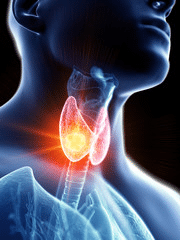Thyroid Cancer Awareness Month
As a 36-year thyroid cancer myself, I wanted to share this timely information with you. Thyroid cancer occurs in the cells of the thyroid — a butterfly-shaped gland located at the base of your neck, just below your Adam’s apple. Your thyroid produces hormones that regulate your heart rate, blood pressure, body temperature and weight.
Thyroid cancer typically doesn’t cause any signs or symptoms early in the disease.
 As thyroid cancer grows, it may cause:
As thyroid cancer grows, it may cause:
- A lump (nodule) that can be felt through the skin on your neck
- Changes to your voice, including increasing hoarseness
- Difficulty swallowing
- Pain in your neck and throat
- Swollen lymph nodes in your neck
Thyroid cancer is classified into types based on the kinds of cells found in the tumor.
Your type is determined when a sample of tissue from your cancer is examined under a microscope. The type of thyroid cancer is considered in determining your treatment and prognosis.Types of thyroid cancer include:
Papillary thyroid cancer
The most common form of thyroid cancer, papillary thyroid cancer arises from follicular cells, which produce and store thyroid hormones. Papillary thyroid cancer can occur at any age, but most often it affects people ages 30 to 50. Doctors sometimes refer to papillary thyroid cancer and follicular thyroid cancer together as differentiated thyroid cancer.
Follicular thyroid cancer
Follicular thyroid cancer also arises from the follicular cells of the thyroid. It usually affects people older than age 50. Hurthle cell cancer is a rare and potentially more aggressive type of follicular thyroid cancer.
Anaplastic thyroid cancer
Anaplastic thyroid cancer is a rare type of thyroid cancer that begins in the follicular cells. It grows rapidly and is very difficult to treat. Anaplastic thyroid cancer typically occurs in adults age 60 and older.
Medullary thyroid cancer
Medullary thyroid cancer begins in thyroid cells called C cells, which produce the hormone calcitonin. Elevated levels of calcitonin in the blood can indicate medullary thyroid cancer at a very early stage. Certain genetic syndromes increase the risk of medullary thyroid cancer, although this genetic link is uncommon.
Other rare types
Other very rare types of cancer that start in the thyroid include thyroid lymphoma, which begins in the immune system cells of the thyroid, and thyroid sarcoma, which begins in the connective tissue cells of the thyroid.
Factors that may increase the risk of thyroid cancer include:
- Female sex. Thyroid cancer occurs more often in women than in men.
- Exposure to high levels of radiation. Radiation therapy treatments to the head and neck increase the risk of thyroid cancer.
- Certain inherited genetic syndromes. Genetic syndromes that increase the risk of thyroid cancer include familial medullary thyroid cancer, multiple endocrine neoplasia, Cowden’s syndrome and familial adenomatous polyposis.
I was only 18 and was getting a physical for college when my doctor found a lump in my throat. I had been gaining weight and my periods had been irregular, both signs of thyroid dysfunction. I underwent a total thyroidectomy with radioactive iodine treatment. While I got off fairly easy as far as cancer treatment goes, it has still affected me everyday of my adult life. I became a personal trainer in an effort to maintain my own healthy body weight while also being able to help others dealing with similar struggles. The pressure to be thin, however, caused me to struggle with eating disorders and body dysmorphia. I have been on every diet including injecting myself with HCG for multiple cycles. I stopped enjoying life and became consumed with my weight, how many calories I had eaten in a given day, and what the scale said. I would be extremely depressed if I had gained weight; even cancelling social events because I didn’t want to eat.
There have been times where my dose of thyroid medication was inadequate and I would gain weight at lightening-speed and was so tired I could not get out of bed.
Finding the proper type and dose of hormone replacement is essential for long-term success and quality of life. The most commonly prescribed thyroid hormone replacement is pure synthetic thyroxine (T4). After decades of being on this, I felt that it was not right for me and went to a naturopathic doctor for help. They prescribed Armour Thyroid. It is the most common desiccated thyroid. It comes from pigs and is a mix of both thyroid hormones, triiodothyronine (T3) and thyroxine (T4). There are few clinical trials on Armour Thyroid, meaning it has not been studied well. Additionally, and importantly, the FDA has not approved it for use. Most physicians will not prescribe it, but I insist on it for my own personal needs.
In terms of side effects, either can cause symptoms of hyperthyroidism. These can include (but are not limited to):
- Arrhythmias (abnormal heart rhythms)
- Heart attack
- Headache
- Nervousness
- Irritability
- Insomnia
- Change in appetite
- Diarrhea
Thyroid hormone can also potentially make liver disease worse if it already exists. In addition, some medications (calcium carbonate, antacids, and cholestyramine) may slow the absorption of thyroid hormones, so you might have to take them at different times of the day. Make sure that you do your own research to find out what the best fit is for you. Don’t let anyone pout you in a “box.” You are in control of your body and your health!
Read about Customized Exercise Programming for Thyroid Cancer.

